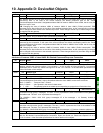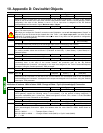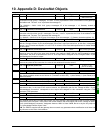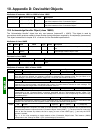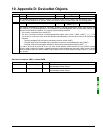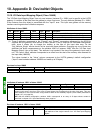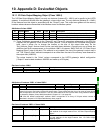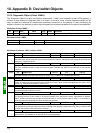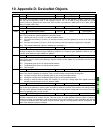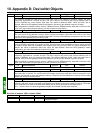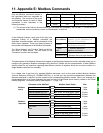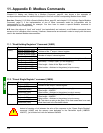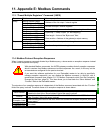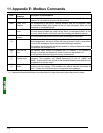
112
10. Appendix D: DeviceNet Objects
ID Access Name Need Type Value
16#11 Get
IN total length
Optional UINT 16#0020
This attribute indicates the total size of the input data used in the gateway’s extended memory (IN bytes
supported), expressed as a number of bytes. This size is equal to the value of the previous attribute (size of
inputs in DPRAM), as it only contains input data. The values of attributes 16#0F, 16#10 and 16#11 are all
identical. With the LUFP9 gateway’s default configuration, the value of this attribute is equal to 32 bytes.
N.B. The gateway’s extended internal memory is different from the DPRAM memory, dealt with in the rest of this
guide. As a result, when using the gateway, you will not have to worry about it.
16#12 Get
OUT cyclic I/O length
Optional UINT 16#0020
This attribute indicates the total size of the cyclic output data (I/O OUT data), expressed as a number of bytes.
This size covers all the gateway’s memory space occupied by Modbus output data, free locations also being
counted. With the LUFP9 gateway’s default configuration, the value of this attribute corresponds to the size of the
output area of the gateway, that is to say 32 bytes.
16#13 Get
OUT DPRAM length
Optional UINT 16#0020
This attribute indicates the total size of the output data and parameters in the gateway’s memory (valid OU
T
bytes in DPRAM), expressed as a number of bytes. This size covers all of the gateway’s memory space occupied
by Modbus output data and parameters, free locations also being counted. Since no output parameters are
defined, the values of attributes 16#12 and 16#13 are both identical. With the LUFP9 gateway’s default
configuration, the value of this attribute is equal to 32 bytes.
16#14 Get
OUT total length
Optional UINT 16#0020
This attribute indicates the total size of the output data used in the gateway’s extended memory (OUT bytes
supported), expressed as a number of bytes. This size is equal to the value of the previous attribute (size of
outputs in DPRAM), as it only contains output data. The values of attributes 16#12, 16#13 and 16#14 are all
identical. With the LUFP9 gateway’s default configuration, the value of this attribute is equal to 32 bytes.
N.B. The gateway’s extended internal memory is different from the DPRAM memory, dealt with in the rest of this
guide. As a result, when using the gateway, you will not have to worry about it.
16#15 Get
Reserved attribute
Optional UINT 16#0000
This attribute is not used.
16#16 Get
Application indication
Optional USINT (8-bit register)
This 8-bit register is reserved for the gateway’s applicative card, that is to say the card on which the AnyBus-S
DeviceNet card is inserted. The various bits of this register are primarily used when internal commands of the
gateway are intended to act on the gateway’s memory. These bits are not intended to be used by the DeviceNet
master and will not be described here.
16#17 Get
AnyBus indication
Optional USINT (8-bit register)
This 8-bit register is reserved for the gateway’s AnyBus-S DeviceNet card. The various bits of this register are
primarily used when internal commands of the gateway are intended to act on the gateway’s memory. These bits
are not intended to be used by the DeviceNet master and will not be described here, except for bit 4:
Bit 4: This bit is set to one once the gateway’s AnyBus-S DeviceNet card has been initialized.
Services of instance 16#01 of class 16#AA
Service code Name of the service Need Description
16#0E Get_Attribute_Single Required This service allows to read the value of the single instance of the
“Diagnostic Object.”



